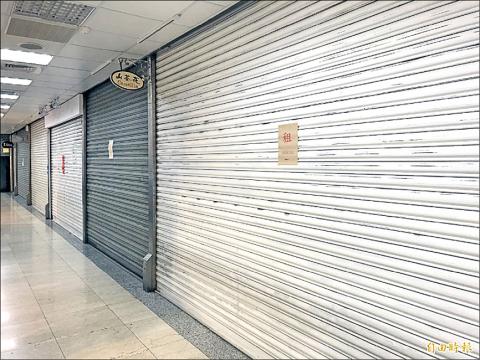Taipei’s eastern shopping area is not in decline, it has only performed relatively weaker compared with other areas, Taipei Mayor Ko Wen-je (柯文哲) said, adding that stores should collaborate on a positioning strategy.
The closure of stores and restaurants in the area has been reported in the past few months, and Chinese Nationalist Party (KMT) Taipei city councilors have criticized the city government over the issue.
In 2017, consumer spending in Taipei was approximately NT$12.5 trillion (US$404.44 billion at the current exchange rate) and grew to NT$13.2 trillion last year, or about 30 percent of the national total, Ko said in a video he posted yesterday on Facebook of a speech he made at the Taipei Business Areas Development and Innovation Forum on Thursday that cited his own report on the eastern shopping area.

Photo: Tsai Ssu-pei, Taipei Times
Money flow in Taipei grew 5.7 percent last year, while the city had a record 237,523 registered businesses and stores as of the end of last year, up 6 percent from a year earlier, he said.
“We are not facing an economic recession. The real problem is uneven distribution,” he said, adding that the statistics show that the city’s economy is growing through large amounts of small payments, while the opening of new businesses has exceeded closures.
With the emergence of cashless transactions, e-commerce, self-service store and artificial intelligence, the consumer experience is being rapidly reshaped and some brick-and-mortar stores are shifting to provide an experience rather than focusing on sales, so it is important for shopping areas to have distinctive positioning, Ko said.
The Dadaocheng (大稻埕) area has its retro atmosphere, the Xinyi District (信義) shopping area aims to attract “rich ladies” and the Ximending (西門町) shopping area is full of young people, he said.
“The city government will not step in to develop a positioning strategy for the eastern shopping area, because the government does not understand the market better than businesses,” Ko said. “Stores should self-organize and tell the city what they want so it can assist them.”
Xinbeitou (新北投), Dadaocheng and Ximending have all “fallen and climbed up again,” he said.
The eastern area is facing its first transformation period, so if it develops a good strategy, the government can organize events and build infrastructure, which would help people and money to return, he said.

Beijing could eventually see a full amphibious invasion of Taiwan as the only "prudent" way to bring about unification, the US Department of Defense said in a newly released annual report to Congress. The Pentagon's "Annual Report to Congress: Military and Security Developments Involving the People's Republic of China 2025," was in many ways similar to last year’s report but reorganized the analysis of the options China has to take over Taiwan. Generally, according to the report, Chinese leaders view the People's Liberation Army's (PLA) capabilities for a Taiwan campaign as improving, but they remain uncertain about its readiness to successfully seize

Taiwan is getting a day off on Christmas for the first time in 25 years. The change comes after opposition parties passed a law earlier this year to add or restore five public holidays, including Constitution Day, which falls on today, Dec. 25. The day marks the 1947 adoption of the constitution of the Republic of China, as the government in Taipei is formally known. Back then the Chinese Nationalist Party (KMT) governed China from Nanjing. When the KMT, now an opposition party in Taiwan, passed the legislation on holidays, it said that they would help “commemorate the history of national development.” That

Taiwan has overtaken South Korea this year in per capita income for the first time in 23 years, IMF data showed. Per capita income is a nation’s GDP divided by the total population, used to compare average wealth levels across countries. Taiwan also beat Japan this year on per capita income, after surpassing it for the first time last year, US magazine Newsweek reported yesterday. Across Asia, Taiwan ranked fourth for per capita income at US$37,827 this year due to sustained economic growth, the report said. In the top three spots were Singapore, Macau and Hong Kong, it said. South

Snow fell on Yushan (Jade Mountain, 玉山) yesterday morning as a continental cold air mass sent temperatures below freezing on Taiwan’s tallest peak, the Central Weather Administration (CWA) said. Snowflakes were seen on Yushan’s north peak from 6:28am to 6:38am, but they did not fully cover the ground and no accumulation was recorded, the CWA said. As of 7:42am, the lowest temperature recorded across Taiwan was minus-5.5°C at Yushan’s Fengkou observatory and minus-4.7°C at the Yushan observatory, CWA data showed. On Hehuanshan (合歡山) in Nantou County, a low of 1.3°C was recorded at 6:39pm, when ice pellets fell at Songsyue Lodge (松雪樓), a